On 10-14 April, Info Sapiens conducted a survey as part of the all-Ukrainian nationally representative poll Omnibus, and ExtremeScan conducted a similar survey “Сhronicles” in Russia: Ukrainians and Russians were invited to write telegrams to each other.
In the telegrams, 24% of Ukrainians express anger and contempt, and 74% - invoke to come to their senses. 46% of Russian telegrams contain words of support, which is abnormal in the situation of war between our two countries, but not surprising in the context of propaganda "liberation of Ukrainians from Bandera and Nazis." A popular message in Russian telegrams was the word "hold on", which ironically corresponded to Dmitry Medvedev's meme.[1].
Unfortunately, some of 46% of telegrams with general words of support meant Russian propaganda «the time will come and you will understand why it was necessary, hold on, we are with you, we will soon come to you and liberate».
However, based on the intersection with other data from the study, about a third of the Russian population has the sincere support for Ukrainians «Hold on. Not all Russians support this operation. There are Russians on your side».
Telegram
The most common telegram of Ukrainians is "open your eyes, start thinking" (14%). Telegrams of similar content, which were conditionally combined into a cluster of "cries to change your mind", accounted for 74% of all telegrams of Ukrainians[2] and only 24% expressed anger. Only 2% of Ukrainians would send positive telegrams: 1% still consider our peoples fraternal, and another 1% indicate that ordinary Russians are not to blame. In general, 10% of Ukrainians said that it was useless to talk to Russians because it did not make sense, and 9% did not know what to say.
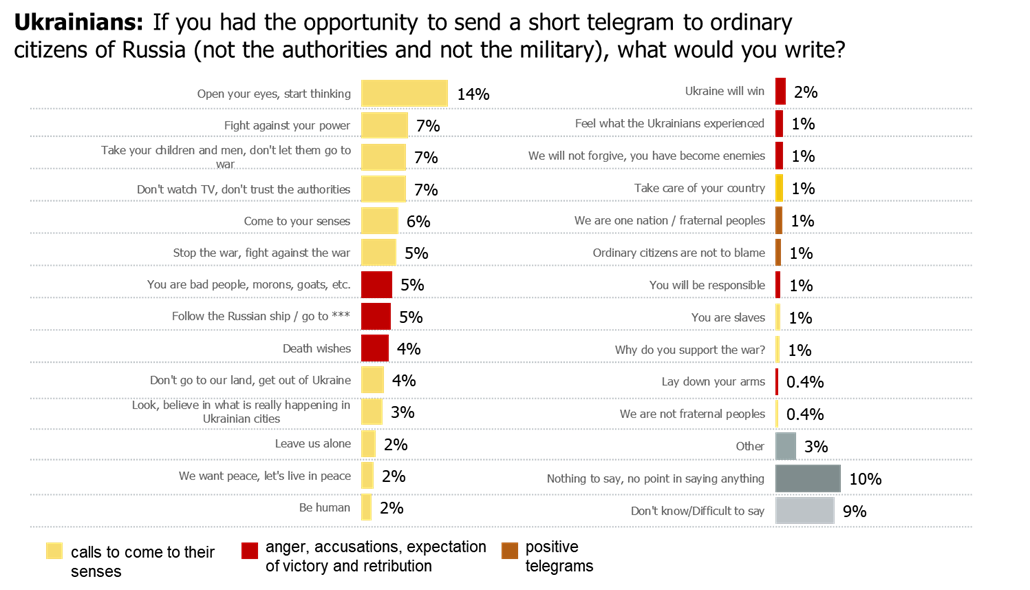
Such a low percentage of angry telegrams does not mean that Ukrainians do not blame ordinary Russians - according to another Info Sapiens poll, 84% of Ukrainians think that Russians are to blame.
“With each passing day of the war, Ukrainians are increasingly delegating responsibility for hostilities not only to the Russian government, but to all citizens of Russia. This is natural for Ukraine, where people feel that they are the subject of decisions in the country, - said Inna Volosevych, Deputy Director of Info Sapiens. - Therefore, instead of expressing their anger (the poll took place after the facts of atrocities in the Kyiv region were made public), Ukrainians are trying to reach out to Russians. This is largely in vain – 36% of Russians indicate they can't even influence their own lives, not to mention Putin's decisions, which they either blindly believe or can't oppose.
In particular, Russian experts indicate that the Russians can be reached only by the economic consequences of the war and personal losses, and not by logic or evidence of atrocities. Even if objective information breaks through, it is perceived through the prism of propaganda and therefore it does not work. But I think it's still worth trying, and I'm glad that Ukrainians keep their humanity despite the genocide against them.”
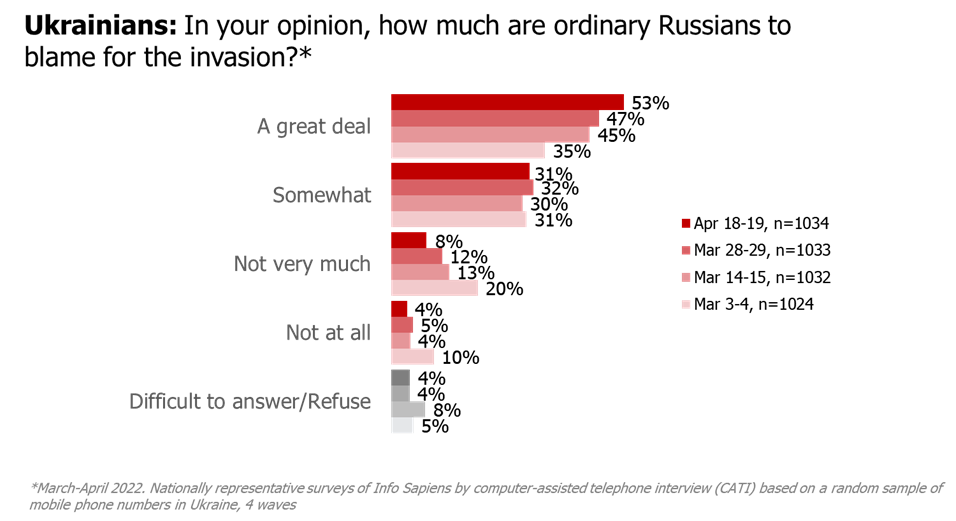
As for Russians, 23% could not formulate a telegram, which, according to the authors of the study, indicates the uncertainty of the population that "their cause is right." 46% of telegrams contained words of support – in this category we coded only those telegrams that did not have propaganda slogans, such as: "hold on, friends, and help us to liberate your own land from fascism", "hold on, hold on, we will win", "hold on, dear, we will win”, "hold on, we will come soon, we will save everyone", "do not listen to your people, hold on to us, you will be fine, we have never offended you anywhere", "do not make the enemies of Russians, we are neighbors, you should live in harmony with your neighbors", "Nazis are bastards, Putin is good, and you hold on, we will support and protect you", "Hold on! We will soon win and liberate the people from tyrants, fascists and American, French presidents and all the corrupt power of the European Union". Such "words of support" were not coded in the cluster of "positive telegrams", but in the clusters of "cries to change your mind" or "praise of Russia".
At the same time, according to the authors of the study, in some of those 46% of the words of support without specification, the support for the struggle against the Ukrainian government was meant. No more than a third of the population expressed real support, without the intention to "liberate".
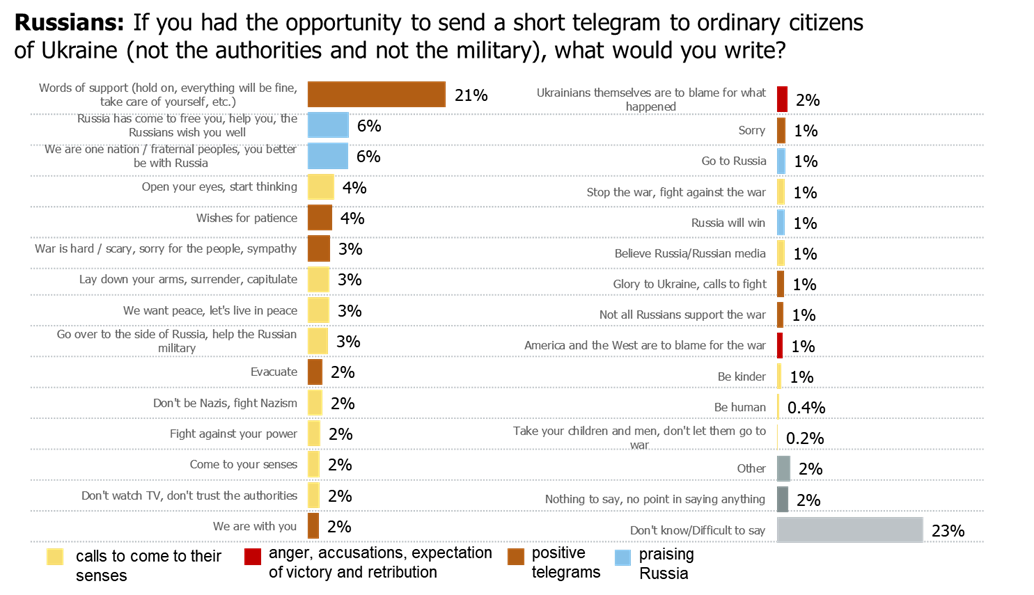
Russians' feelings about the war
69% of Russians sympathize with Ukrainians and 66% with Russians, while the former ones are being killed and slaughtered, and the latter are only experiencing economic difficulties.
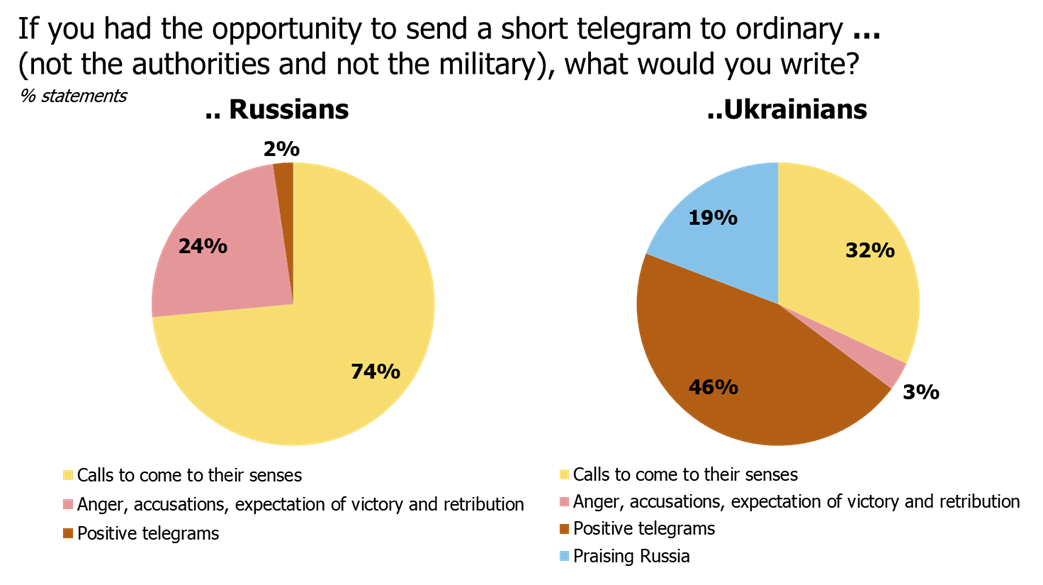
71% of Russians have a sense of justice about the "military operation"[3], 69% feel proud, 64% - trust, but only 40% feel uplifted, so, perhaps, somewhere in the subconscious of the majority there is a suspicion that something is wrong.
Only 12% of respondents feel ashamed, there are relatively a few of them, but their voice was heard in Russia – which is why the expression "I'm not ashamed" has become a popular meme, despite the statements of people protesting against the "military operation". 75% of respondents in Russia do not feel ashamed, but their motivation is not the same. There are some people who do not feel ashamed not because they support the war, but because they always supported Ukraine.
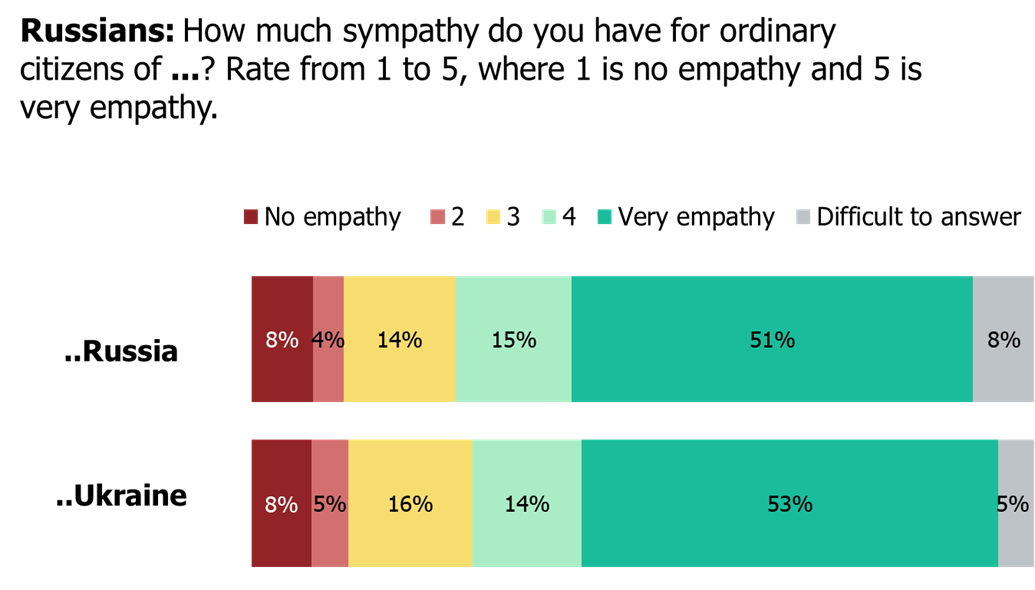
The questions about the support for “special operation”
66% of Russians support the "special operation". The respondents were read the option "I do not want to answer this question", which includes 12-13%, so this figure is closer to reality than what is shown by state posters in Russia.
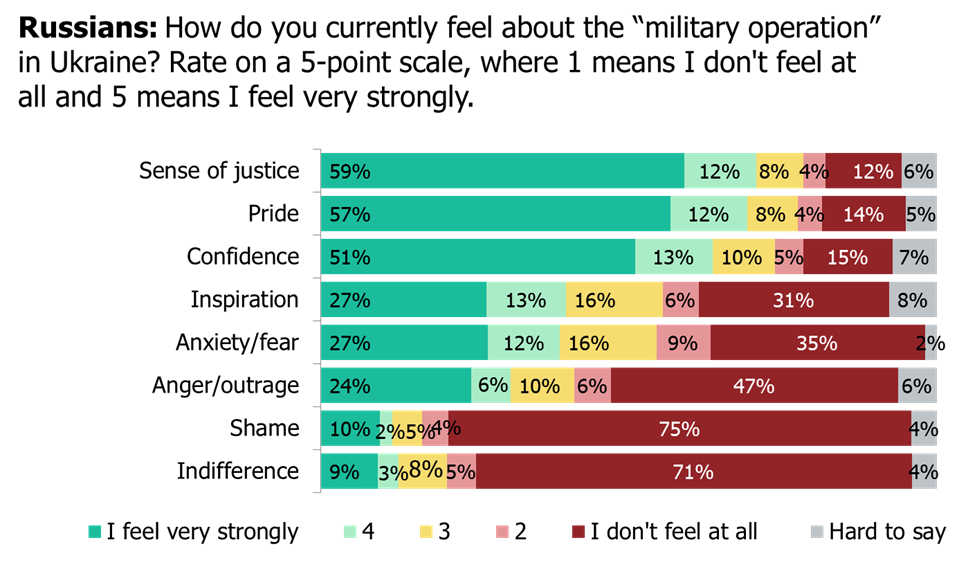
Russians about the attitude of Ukrainians to Russia
It seems that most Russians have no idea about the attitude of Ukrainians towards them: in response to the question "why do Ukrainians flee to the EU and not to Russia?" 37% said that the Ukrainian military does not allow their fellow citizens in Russia, 25% - that conditions in the EU are better, and 16% - that they can’t get there. Only 36% indicate that Ukrainians consider Russia an enemy, and 16% - that they are afraid of persecution in Russia (a total of 45% mention that something wrong is going on between Ukrainians and Russia, i.e. choose one of these options or both).
In previous ExtremeScan measurements, Russians were asked how Ukrainians felt about Russian troops, and 30% of respondents thought that they were friendly. And in mid-March, 15% thought that hostilities were taking place only in the Donbass.
All this confirms not so low awareness of citizens in Russia as the syndrome of tunnel perception, when people hear only what they are comfortable hearing.
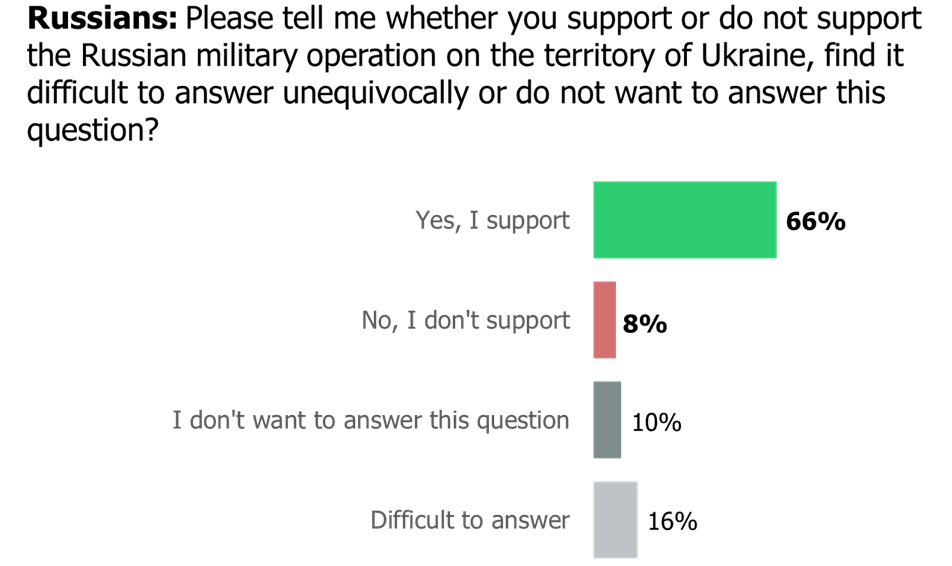
Subjectivity of Russians
22% of Russians believe that they cannot influence their own lives at all – there are 10% of those among Ukrainians, and such an answer would be more natural for us at this time, since we can not influence Russia's plans and actions. In total, 36% of Russians rated their impact on their lives at 1-4 on a 10-point scale, while there were 18% among Ukrainians. The rates 5-10 were given by 38% and 53%, respectively.
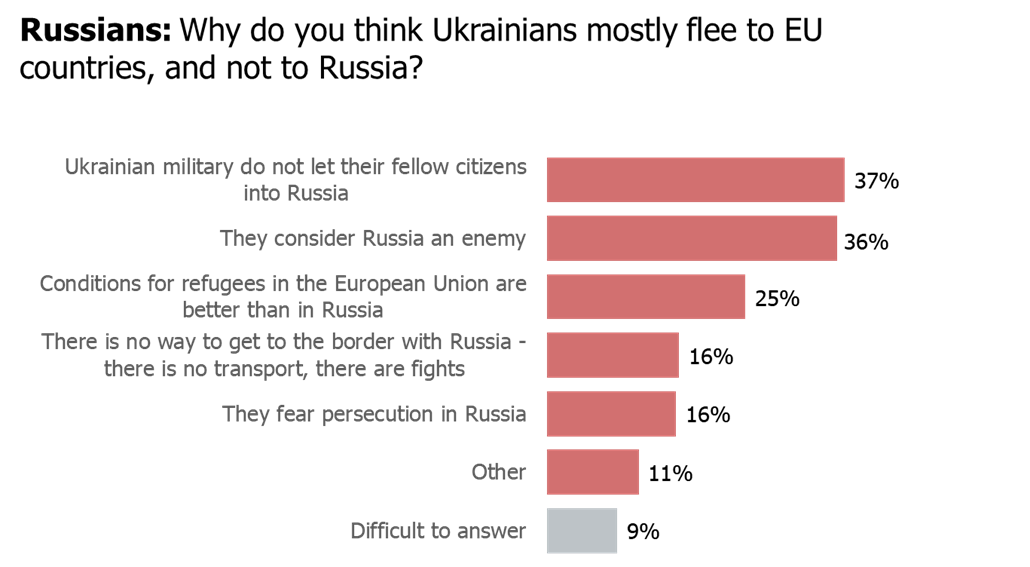
According to researchers, the lack of Russian subjectivity is clearly reflected in the answers to the questions "should Russia end the military operation as soon as possible" and "if the further development of the military operation depended on you personally, would you stop the operation right now?": 30% answered affirmatively to the first question, and only 19% - to the second. So, one third of Russians who believe that the war should be stopped are not ready to stop it themselves, because they are afraid of personal responsibility – what if "not everything is so clear."
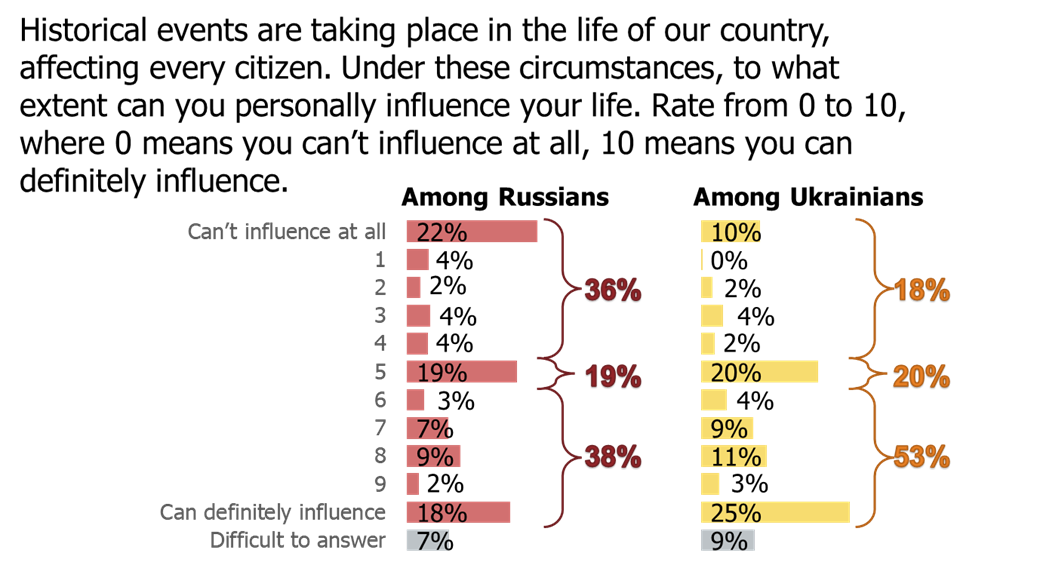
At the same time, 42% of Russians feel moral responsibility for the "special operation" – and this responsibility is more often felt by those who do not support it, although it would be more logical to be the opposite.
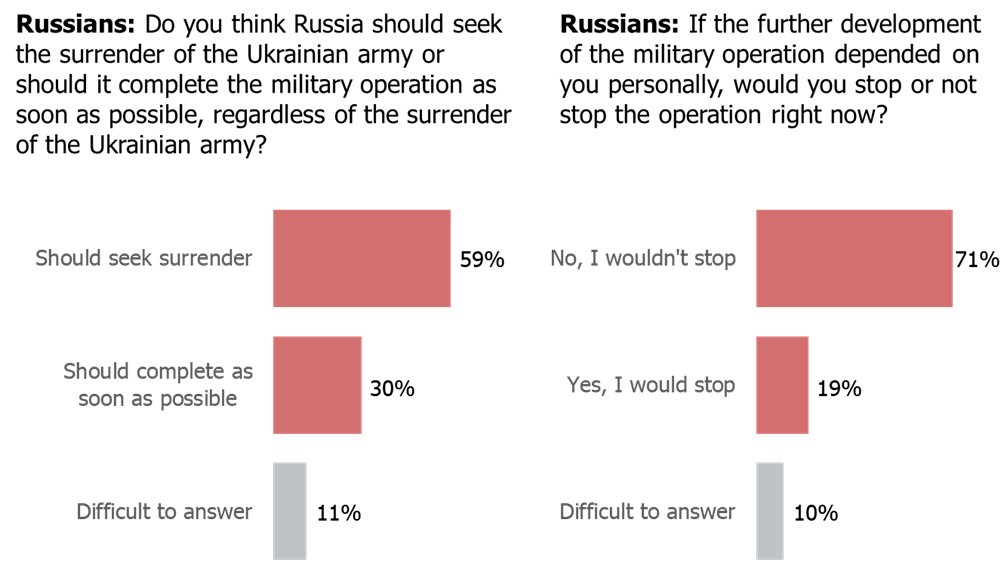
According to O. Koneva from ExtremeScan, this is the main difference between the two peoples – Russians are submissive, paternalism removes responsibility for decision-making, makes the perception of even the current historical situation more anticipatory and relaxed. The anarchism of Ukrainians leads to a critical perception of the actions of the authorities, the unpredictability of citizens and at the same time to the incredible unity in moments of common trials and sincere spontaneous consolidation "under one flag" (according to Info Sapiens, Zelensky's presidential rating increased from 26% among those who made their mind in February before the war to 82% in April 2022). Thus, in our parallel study, the confrontation between the mentalities and motivations of the two warring parties was reflected.
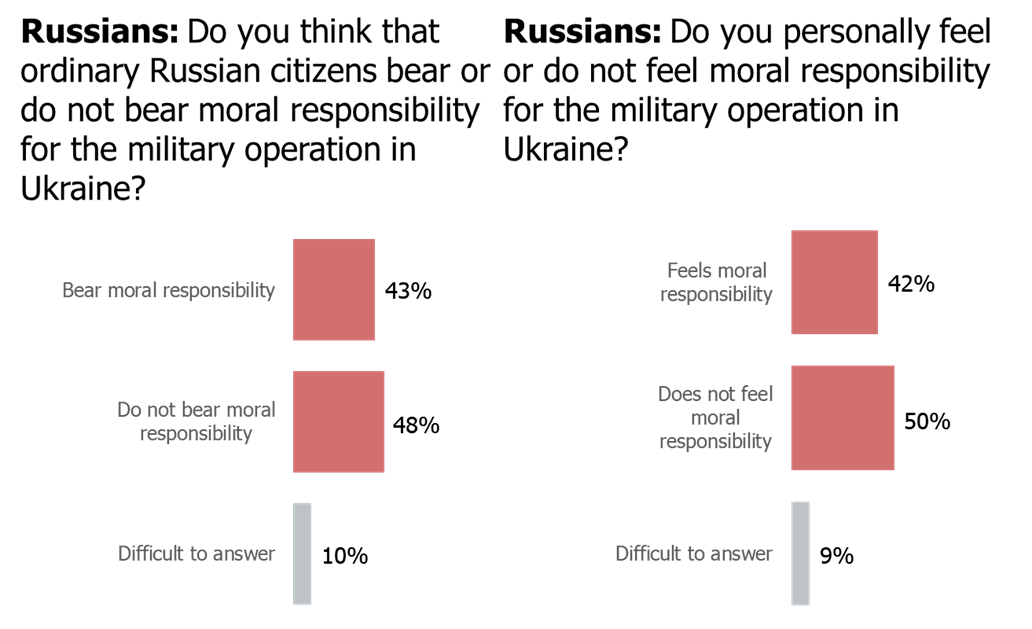
Research Information
The Omnibus sample consists of 1000 respondents, the sample of ExtremeScan is 1613 respondents. The survey was conducted by CATI (computer-assisted telephone interviews) based on a random sample of mobile phone numbers. The sample is representative of the population of Ukraine aged 16 years old and older by gender, age, size of settlement and region of residence. The Autonomous Republic of Crimea and the city of Sevastopol were removed from the study. In Donetsk and Luhansk oblasts, the survey was conducted only in the territories controlled by Ukraine. Also, the survey does not cover Ukrainians who have gone abroad, and residents of occupied settlements where there is no connection.
The sample of the ExtremeScan “Chronicles” survey is representative of the population of the Russian Federation aged 18 years old and older by gender, age, size of settlement and region of residence. The poll was conducted by a group of independent Russian sociologists who do not support the war.
The maximum theoretical error for Ukraine does not exceed 3.1%, for Russia – 2.4%. The survey was conducted on 10-14 April, 2022 in Ukraine and on 13-18 April – in Russia.
"Telegrams" are published in a separate file.
Links to download press releases and presentations
- Download the press release in ukrainian in .pdf
- Download the presentation in ukrainian in .pdf
- Download the press release in english in .pdf
- Download the presentation in english in .pdf
- Download the press release in russian in .pdf
- Download the presentation in russian in .pdf
- Download telegrams in .xlsx
